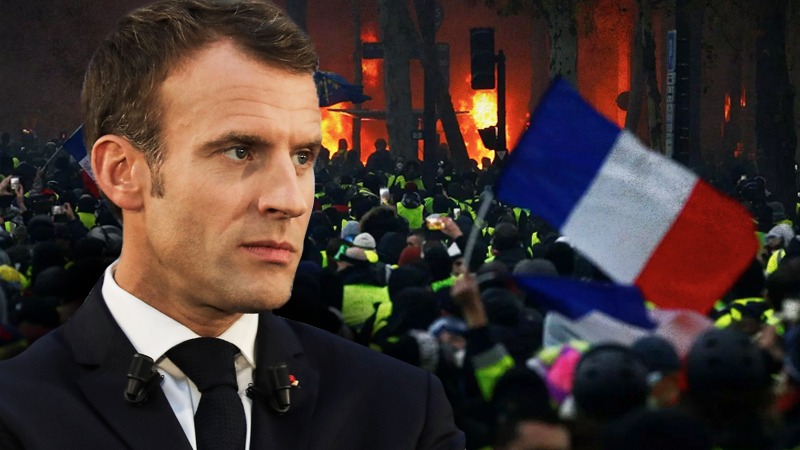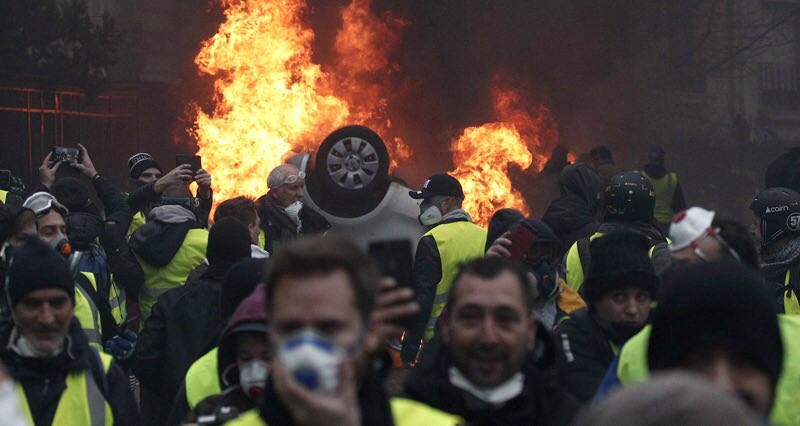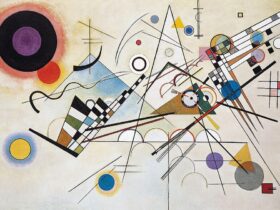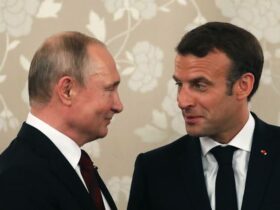3rd of three articles (first and second on UWI).
Nation, worker, left and right… all of these ideas, of course, are just the musings and falterings of intellectuals of and political analysts. Regular people, who form the backbone of the movement, that is, the People themselves, do not attach great importance to any of it. They only want to succeed. Besides, history teaches us that the main characteristic of a revolutionary “rise” is that it is, in actual fact, the awakening masses pushing their “leaders” forward, rather than the other way around.
“It’s all or nothing,” says Mark, the young leader of a local railway trade union, who seems close to the Trotskyite NPA (ex-LCR). One of the NPA’s tendencies, the group “Revolution Permanente,” is holding a meeting in Paris, together with the “Committee of the Wounded” and the “Women’s Yellow Vests Assembly”.
“Revolution Permanente” seems to be obsessed somehow by their focus on the expected role of the working class, of the “proletariat”. Their books describe this role, but they have not predicted that Renault, a French car manufacturer which used to employ some 42,000 people, now employs ten times fewer, not to mention that production itself has become decentralized, much of it outside of France.
Nonetheless, these facts notwithstanding, this obsession continues. “Revolution Permanente” seems to represent one of the friendliest currents of the “radical left” to the current protests. They don’t feel the repulsion many segments of the French “revolutionary left” feel for national symbols… they accept them, even if they are not fully sure why the People feel the need to use them.
The grass-root classes, including the working class, do not need class symbols when they are already expressing the will of the Nation. The Yellow vests protesters have no reason to rally behind “class” symbols when an overwhelming majority of French society already supports their demands; why side with the “part” when they have already represent the “whole”?
But there is also a deeper reason. What has been happening in France over the last three months is not just a battle among various social forces about the direction that their nation-state should take. The question here – that is, in this specific historical and spatial juncture – is whether World Finance will completely abduct what remains of the French nation-state!
The French bourgeoisie may not have surrendered France to a foreign country as it did in 1871 causing the Paris Commune, or as it did again in 1940 with Petain’s Vichy… yet, it has unconditionally surrendered the country to an alien force: global Financial Capital and its Empire. A representative of this Empire, a Rothschild banker, was essentially “appointed” to run France in the same way he might be appointed to run another subsidiary of a Bank.
By “appointing” a banker as President, they completed the transformation of the State into such a subsidiary.
And by pretending they are Gods, they provoked the Revolution.
This is something that is much better understood, rather, “felt,” by the people than by their aspiring leaders. As we have already noted, this is why protesters wave the tricolor flag of the Republic and sing their national anthem.
Napoleon also knew the subversive, revolutionary potential of the Marseillaise, which is why he banned it upon becoming an Emperor; just as Marshal Petain did much later as head of the Third Reich-collaborationist Vichy regime. It is also striking that there was just one flaw in Marcon ’s otherwise impeccable and impressive inauguration ceremony. After his election in 2017, looking visibly embarrassed, he did not sing along to the national anthem as everyone else around him did.
Symbols are important, not just in and of themselves, but as a means of organizing the thoughts and emotions of millions of people.
Crossing the Rubicon
Inside the conference room, near the metro station Voltaire, where the “Permanent Revolution” group is holding their meeting with the “Committee of the Wounded” and the “Women’s Assembly”, it is freezing cold and seats are scarce. But this does not deter hundreds of people from attending and staying until the end, listening to the discussion with dedication despite having to stand for hours in the packed room.
The representative of the “Women’s Assembly” describes the problems of working women in France. People have started talking in France and they are not about to stop. They talk in meetings, assemblies, on Facebook, expressing themselves at any chance they get – but never through the media, which, now more than any time in the past, seems to exist in an almost virtual world of its own. Their unbearable social suffering, the every-day problems of the lower social classes, of the abandoned, despised, unappreciated, isolated half of the society of France, a country which, up until the emergence of the yellow vest movement, was envied for its prosperity, social progress and freedom – or at least, that’s how it had been marketed.
For a long time, and even today, western media sources do the best they can to conceal the degree of social regression which has been characterizing Europe over the last several decades, especially the last 10 years, since the financial crisis of 2008. They are trying to preserve – with the help of their obedient Media and deceptive “European statistics” (such as considering someone who works 10 hours a month to be employed) – the increasingly fake, or at least very partial, image of a prosperous and affluent Europe, which, assuming it existed, is relevant for only a diminishing portion of the continent’s population.
But if European reality was as depicted by the media, it would have been impossible to explain both the yellow vest movement and the voting patterns of European citizens in all elections and referendums.
Now it’s 20-year old Frank’s turn to take to the microphone. There is complete silence in the room, as he describes in simple words and a broken voice, how he got blinded in one eye by a tear gas grenade, that he doesn’t know if he will ever be able to work again, and that he has already lost half his weight. He talks about the 20 surgeries that he has been subjected to as doctors were trying to save his eye before he was finally told that they will stop trying as he won’t be able to survive any further surgeries.
The audience listens, their eyes filling with tears, as the young man closes his speech by saying “What I have suffered makes me what I am” (Ce que j’ai subi fait de moi ce que je suis).
I can’t help but wonder if those who decided to launch this type of crackdown are able to understand its consequences, and thus deliberately cause them, or they are just losing their cool.
It is obvious that the “seeds”, which have already been planted will sooner or later grow and that, regardless of how the current ongoing crisis will unfold, these are the type of seeds which can create a social psychological abyss in a country and lead, no one knows when or how, to deadlocks that can only be solved by revolutions, civil wars or dictatorships. Indeed, we still haven’t met anyone across the political spectrum here in France, from the far left to the far right, who does not recognize that such risks exist.
Even if by some magic the Yellow Vests were to disappear tomorrow, it would be impossible to erase their mark completely. When the Interior Minister Castaner visits a primary school to discuss with the children, a small pupil asks him:
“Do you think the Yellow Vests have already entered into History?”
But, if the Yellow Vests enter into History for good, there will not be much place left for Castaner, Macron and their friends.
In Place de la Republique, a middle-aged protester expresses his anger about the President and the government by shouting: “Kings have been killed for much less than the things you do” and the crowd erupts: “Macron resign!” (Macron Demission!)

Searching for the “Incorruptible”
Robespierre became known as the “Incorruptible”, which means “a person not susceptible to corruption”.
The Yellow Vests do not trust politicians, parties, trade unions or any other form of representation, which are all facing an unprecedented credibility crisis in France. This is one of the main reasons explaining the Yellow Vests “fixation” with avoiding any form of leadership and representation. A “fixation” which so far has proved very useful, but one could hardly imagine how they could continue growing in this fashion without a problem.
“Power of the People by the People for the People” is their main slogan, and they apply it first of all to themselves.
“Our advantage is that we can be everywhere and nowhere at the same time. There are no leaders for the government to find, to negotiate with and buy them off” explains Xavier Renou, an active organizer of the yellow vest movement in the small town of Persan-Beaumont, north of Paris.
He is with Melenchon’s “France Insoumise”, but he has “forgotten” his party affiliation. He put aside any display of party preferences to participate in a movement which, so far, has stubbornly rejected any affiliation. Only recently, during the strike on February 5th, which was called in response to grass-roots pressure by CGT, did one of France’s three main trade unions demonstrate together with the Yellow Vests, albeit in different blocks.
Yes to Politics, no to Politicians! A left-wing movement that does not want to be called left
It’s not only the fear of corrupt and corruptible leaders and representatives… the “Yellow Vests,” whether one agrees with them or not, are a spontaneous and deeply cross-class movement starting at the grass-root level, where the anger about a specific issue met the widespread realization, by millions of people simultaneously, of the fact that if they don’t take action themselves, there is nobody else to save their post-war welfare state and socio-democratic social contract from their neoliberal demolition. No one to halt the kidnapping of Democracy by the representatives of the financial capital. A majority of people on both the right left-wing seem to identify with this latter interpretation.
It is precisely because of their willingness to succeed that the “masses” isolate anything that could divide them or have a negative impact on the movement’s further development. For example, despite the fact that 70% of the demands of the movement are identical to the political programme of the left-wing “France Insoumise”, the Vests have so far prevented it from playing any significant role in their activities, keeping their distance from it.
Hence, in France, at present, we see the development of a movement which seems to be very “left-wing” in terms of principles, ideas, demands, values or slogans, but which does not wish to be called “left”.
Besides, the “radicalism” of French society, as in other western countries, is manifested towards both the “radical left” and the “radical right” and in the ranks of the Yellow Vest movement one can find supporters and even cadres of parties from both ends of the political spectrum, as well as apolitical citizens. Thus, if the Yellow Vests were to start expressing any political party preferences, they would automatically lose part of the support they enjoy, becoming an easy target for their opponents and undermining their struggle.
At the beginning, some protestors put pressure on the movement through a debate on the issues of “identity” and immigration. The masses quickly realized that this would divide their movement, and reacted by isolating those elements. On the other hand, the very act of revolting is in itself what unites the whites, Arabs and blacks of the workers’ “Suburbs” by bringing to the fore shared experiences of common problems and directing their attention to the “common enemy” instead of playing a kind of “civil conflict” to the benefit of Financial Capital, the Rothschilds and the Rockefellers.
Picture of the day. #giletsjaunes pic.twitter.com/pbrnfyG6Lw
— Middle East Observer (@byz_observer) March 18, 2019
The Yellow Vest movement is a deeply political movement which raises fundamental demands such as restoring a decent standard of living for the grass-root classes and regaining control of “parliamentary democracy”. It’s not an “apolitical” movement as, rather “flippantly” in our opinion, it was classified by some analysts, who are, at best, prisoners of their own rigid classification schemes.
However, in order to realize its objectives, within this specific historical time and place, there is no other option than putting aside, at least for now, any political dividing lines. In order to become “political”, at the level they want, the movement feels that it must get rid of current political forces and their representatives and unite as many people as possible, as well as social classes, behind its social and democratic endeavor.
By getting rid of the current political schemas, they want to find the original, moral and social meaning of politics. “We draw our inspiration from what you, the Greeks, once did; from the Agora, the place where people gather, discuss their problems and take decisions,” Xavier Ranou tells me. The idea of forming a Constitutional Assembly by choosing members at random among citizens (also inspired by the institutions of the Athenian Democracy) has also surfaced during discussions.
Where is France going?
It is of course very early to make any clear prediction about where all this is leading. It may sound unbelievable, but over the last three weeks, we haven’t been able to find any Frenchman, either from the far left or the far right, nor from among the President’s supporters or avowed opponents, any politician, journalist or activist, who could, with any degree of certainty, give us an answer to the question “Where is France going?”
The only thing that everyone agrees on is that nothing will ever be the same again in France, nor in Europe by extension.
“A revolution is unthinkable just one hour before it happens. Everyone is certain about it after its first victory…” By repeating these words from the German Socialist Rosa Luxemburg, ecologist, “alternative globalization” supporter and Yellow Vest phenomena author Patrick Farbiaz tries, in a somewhat sybillic way, to describe the situation in his country.
In Rue d’Aubervilliers, in a working-class district of Paris, the street painter Pascal Boyart gives his own answer to the question or, at least, he expresses his wish, by decorating an entire wall with his adaptation of Eugene Delacroix’s famous painting “Liberty Leading the People” which was inspired by the Revolution of July 1830. In his version of Romantic-era masterpiece, the Yellow Vests raise the flag of the French Revolution and the French Republic.

















Leave a Reply